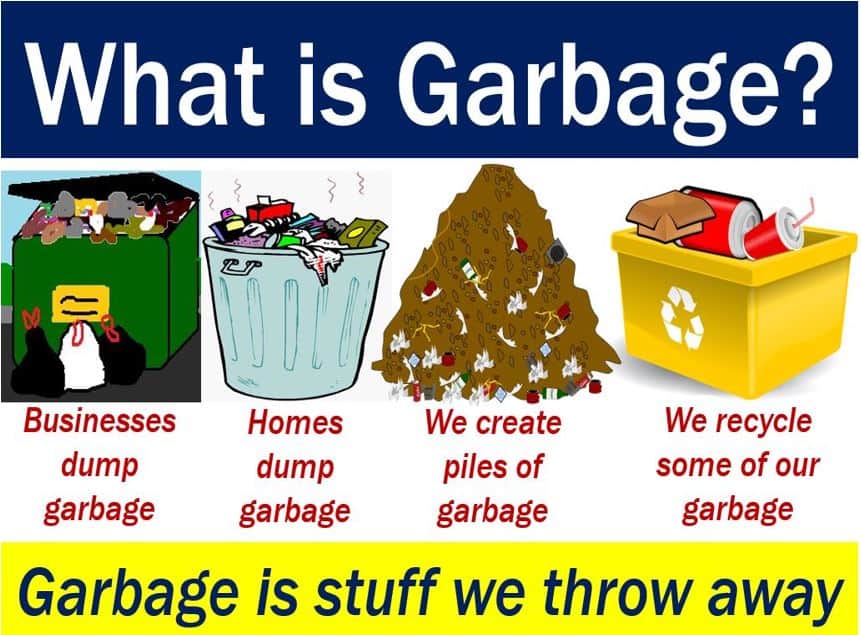Garbage, waste, trash, refuse, or rubbish is stuff we throw away. We also use the term abstractly when we want to say that something is meaningless, untrue, or incorrect. For example, if one person says “Dr. Vladinsky says that water boils at 70 °C at ground level,” another person may respond with “That’s garbage.” This means that the other person is saying that the statement is untrue, i.e., it is rubbish.
The term does not usually refer to gaseous or purely liquid wastes, toxic waste products, or bodily waste products.
We usually sort waste into different categories when disposing of it. We destine some of it, for example, for recycling.
In the world of IT, garbage refers to data in a computer’s memory that we don’t want. IT stands for Information Technology.
The term, with the meaning ‘refuse or filth’ first appeared in the English language in Britain in the 1580s. People used the word earlier, but it meant ‘giblets, refuse of a fowl, or the waste part of an animal.’
Etymologists are not sure where the term came from. Some say that it probably originated from Anglo-French. Etymologists study the origin of words and how their meanings evolved.

Garbage – a subjective term
What one person sees as garbage might be something else for another person. What constitutes the term is very subjective. Some people may discard something that others find restorable or useful.
People in one country may throw something away, which individuals in another part of the world keep.
Garbage in the 1880s
In the 1880s, there were four types of waste: garbage, rubbish, street-sweepings, and ashes (from the burning of wood or coal).
People used to give garbage, which consisted of kitchen or food scraps, to pigs and other livestock.
It was also rendered, i.e., boiled down, to extract fats, oils, and greases for manufacturing lubricants. Farmers would use it as a fertilizer.
The term ‘rubbish’ referred to dry goods such as tin cans, bottles, boxes. Rubbish also included goods made from cloth. People would transform rubbish into new consumer goods.
Today’s ‘wasteful’ society
We have become a wasteful society. Studies have shown that we throw away over ninety percent of everything we buy within one year.
Our ancestors were significantly less wasteful than we are. One hundred years ago, shirts and socks lasted many years and even decades. If I detect a hole in one of my socks, I throw it away. My great grandparents, however, would have darned it.
Scientists say that if we want global sustainable economic growth, we will need to learn to use our resources more carefully. Sustainable growth refers to GDP. GDP stands for Gross Domestic Product. Sustainable growth is all about growing consistently without hitting problems or making new problems for the future.
